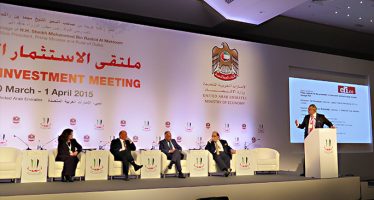Making Every Drop Count: Reducing Water Loss in the Middle East and North Africa Region
- The problem of water loss has become an even greater challenge for public utilities throughout the Middle East and North Africa region due to climate change, which threatens natural water supplies and increases the cost of new waterresources.
- Malta, with one of the world’s highest population density and lowest renewable water supplies, switched from building more desalination plants to meet rising demand to a more effective strategy focused on water loss.
- The World Bank organized a conference that brought representatives from 30 regional utilities to Malta, to learn how the island implemented its successful campaign to lower water loss.

NASA satellites reveal massive water loss in the Middle East.
NASA
Water loss, and its operational and financial consequences, is a major concern for urban water utilities in the Mediterranean region. Losses, both physical and commercial, are due to leakages and the failure to bill customers for the full amount of water they use. A combination of these two factors puts the financial viability of water utilities at risk.
In countries already coping with water scarcity, the burden of water loss often leads to rationing and intermittent supply. As climate change exacerbates the problem—threatening the supply of renewable water and increasing the cost of new water resources—reducing losses from leaky pipes and under-billing, is becoming a priority for water utilities in the Mediterranean and throughout the Middle East and North Africa (MENA) region.
Malta, situated at the very center of the Mediterranean, provides a remarkable illustration of how major water resources challenges can be successfully overcome. The island has one of the lowest rates of renewable water supplies in the MENA region, at 100 m3 per capita per year. It also stands in the top ten countries with the highest population density, alongside Gaza, Bahrain, Hong Kong and Singapore.
Several decades ago, Malta became one of the first countries in the region to invest in desalination plants but, in the 1990s, as new plants were being built to meet increasing demand, it became clear that demand for water was fast outstripping its supply.
The Water Services Corporation (WSC), Malta’s national water utility, turned its attention to water loss instead, initiating an aggressive program that achieved significant results. In addition to state-of-the-art concepts and technology for monitoring and reducing leakages, the WSC also put in place a program to optimize energy consumption at its desalination plants, reducing average energy consumption from 6-7 to 4.5 kWh/m3.
“The success of the program allowed the WSC to decommission two desalination plants and reduce the level of water extraction from the island’s aquifer to levels not seen since the 1960s.”
The success of the program allowed the WSC to de commission two desalination plants and reduce the level of water extraction from the island’s aquifer to levels not seen since the 1960s. The leakage in the water distribution network “was around 4000m3/hr in 1995, yet [has] decreased to below 450m3/hr today”, according to Stephan Riolo, executive director of the network’s infrastructure in Malta.
Malta clearly had lessons to share in reducing water losses and operating desalination plants. As part of their program of support for MENA countries, the World Bank therefore organized a conference on the small Mediterranean island that brought together 30 senior officials from major water utilities in Morocco, Tunisia, Libya, Lebanon, the Palestinian Territories and Yemen.
All the countries that participated are facing similar problems and have keen interest in reducing losses and improving the management of their water supply. Most said that in their experience, however, reducing water losses had proved difficult and complex. Malta’s case was particularly valuable as it shows that countries can achieve successful water loss reduction, as long as it is part of a comprehensive, well-designed program.
The WSC had applied a structured approach based on four pillars: (i) the acknowledgement of the many components of water loss and the interaction between them, (ii) the need to take into consideration, when setting targets, the economically acceptable level of non-revenue water (water supplied but not billed for), (iii) the need to move away from short-term interventions, and (iv) the recognition that water loss lies at the core of assets management.
Participants agreed that replicating the WSC’s success in other MENA countries would require a similarly structured approach, based on long-term strategic planning. This would have to include the following phases: (i) a careful diagnosis of the water loss situation, identifying activities that would generate the largest savings, and setting realistic targets, (ii) a comprehensive program of intervention covering all relevant aspects of water loss (as opposed to “one shot” actions), and (iii) institutional reforms to establish the right framework for maintaining the utility’s economic performance.
There was great interest from all participants to move forward with specific technical assistance, with the WSC transferring its knowledge through peer-to-peer exchanges and a twinning approach. It was agreed that twinning activities between the WSC, Tunisia’s SONEDE utility, and utilities in Gaza, would be supported, in part through a grant from the Center Mediterranean Integration.
Other participants, such as Morocco’s ONEE, Northern Lebanon’s water establishment, and utilities from Sana’a and Aden, also expressed their interest in exchanges with the WSC. Based on this, a comprehensive twinning program between the WSC and MENA utilities will be finalized in the next few months, so as to start exchanges in the field before the end of 2014.
You may have an interest in also reading…
Annual Investment Meeting (AIM), Ministry of Economy, United Arab Emirates, 2015
AIM 2015, which was held from 30 March – 1 April at the Dubai international Convention and Exhibition Center, focused
UNCDF: Time to ‘Youth-Up’ – the Status Quo Simply Has to Be Adjusted
“It’s time to sustainably invest in youth affairs and future generations”, argues Edoardo Tancioni. As the world grapples with conflict,
Brazil: Arrest of Fraudsters Decreases Deforestation Rate
One man can make a difference. Since Brazilian authorities in August 2014 issued an arrest warrant and forced Ezequiel Antônio

















































































